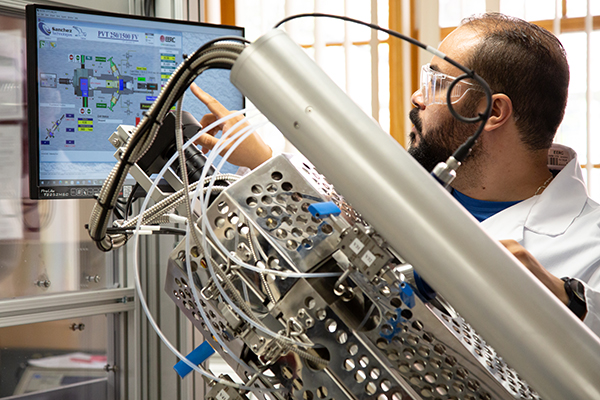Electrochemical Research

Discovering Alternative Solutions to Energy
At the EERC, our electrochemical research spans diverse areas, all aimed at creating economically viable solutions to energy and environmental challenges. With a multidisciplinary approach, we focus on power generation, chemical synthesis, energy storage, and metal extractions to drive innovation in electrochemistry.
Current Research Areas
Our research in electrolyzer and fuel cell technology aims to advance clean power generation through efficient and sustainable means. We are exploring novel methods for the synthesis of ammonia, ethanol, hydrogen, and syngas, with a focus on enhancing efficiency and reducing environmental impact. Our efforts in energy storage encompass both electrical and chemical solutions to enable reliable and scalable energy storage systems. Additionally, the EERC is at the forefront of developing environmentally friendly processes for extracting rare earth elements (REEs) from coal ash, contributing to sustainable resource utilization.
Notable Technologies
Rare earth extraction from coal ash
The EERC has developed a novel low-temperature electrochemical extraction process for retrieving REEs from lignite coal ash (LCA) solutions. Results from studies confirmed an overall 26% REE recovery from the LCA solution, with 16 out of the 17 REEs extracted from the LCA solution. Studies show an environmentally benign and energy-efficient REE extraction process that is suitable for coal and coal by-products.
Learn more about our REE research
Fuel cell technology
The EERC is at the forefront of research in fuel cell technology, focusing on advancements in power generation and sustainability. Our research encompasses the development of fuel cell and electrolyzer materials, electrode design, and system optimization for enhanced performance and durability. Fuel cells offer a promising solution for clean energy generation in various applications, including transportation, stationary power, and portable electronics.
Low-pressure electrolytic ammonia (LPEA) technology
The LPEA technology utilizes electricity to eliminate the need for high pressure in ammonia synthesis. When integrated with renewable and/or low-carbon electricity, this technology offers a sustainable, modular, scalable approach to ammonia production, with potential applications in agriculture, energy storage, and fuel cell technologies.
Novel carbon-free catalyst support for proton exchange membrane fuel cells (PEMFC)
The EERC has pioneered the development of a carbon-free catalyst support material for PEMFCs. This innovative catalyst support offers improved performance, durability, and cost-effectiveness compared to traditional carbon-based supports. By enhancing the efficiency of PEMFCs, this technology advances clean energy solutions.
Electrochemically enhanced fermentation
The EERC is exploring the viability of electrochemical pathways to enhance fermentation processes for producing ethanol and other chemicals. The electrochemical pathway maximizes ethanol yield and minimizes CO2 emissions by precisely deploying electricity to augment or replace metabolically generated energy during fermentation.
